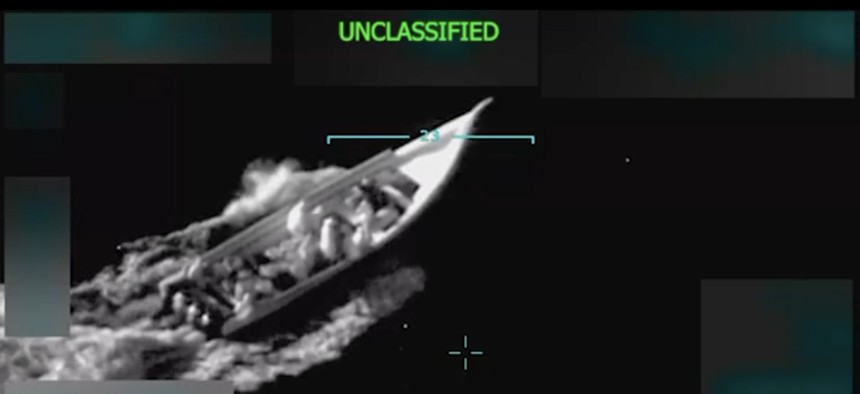
The United States has crossed a dangerous line.
Last week, an American military platform destroyed a small vessel in the Caribbean, killing 11 people the Trump administration claims were drug traffickers. It was not an interception. It was not a boarding with Coast Guard legal authority. It was a strike—ordered from Washington, executed in international waters, and justified with little more than “trust us.” Defense Secretary Pete Hegseth told Fox that officials “knew exactly who was in that boat” and “exactly what they were doing.” He offered no evidence.
This was not a counterdrug operation. It was not law enforcement. It was killing without process. And it was, to all appearances, against the letter and the spirit of the law.
For decades, the U.S. military and Coast Guard have intercepted drug shipments in the Caribbean and Eastern Pacific under a careful legal framework: Coast Guard officers would tactically control Navy ships, invoke law enforcement authority, stop vessels, and detain crews for prosecution. The goal is not execution; it is interdiction within international law.
This week’s strike ripped up that framework. The people on board were not given the chance to surrender. No evidence was presented. No rules of engagement were cited. The administration claimed authority to kill on suspicion alone.
International law does not permit such action. A vessel in international waters is not a lawful target simply because officials say so. Contending that narcotics pose a long-term danger to Americans is at best a weak policy argument, not a legal justification for force. Unless this boat posed an imminent threat of attack—which no one has claimed—blowing it out of the water is not self-defense. It is killing at sea. A government that ignores these distinctions is not fighting cartels. It is discarding the rule of law.
Beyond the gross violations of the law and the Constitution lies an enormous strategic danger. By redefining traffickers as legitimate military targets, the administration has plunged the United States into another war without limits.
Who is the enemy? “Cartels,” we are told. But cartels are not armies. They are networks that span countries and blend with civilians. Declaring war on them is like declaring war on poverty or terrorism—a plunge into an endless campaign that cannot be “won.”
Where is the battlefield? The Caribbean? Venezuela? Central America? Overnight, officials shifted their story about the destroyed vessel’s destination: first, it was “probably headed to Trinidad or some other country in the Caribbean,” then it was among “imminent threats to the United States.” If geography is that malleable, there is no limit to where the next strike may fall.
And what is the objective? To “blow up and get rid of them,” in the words of Secretary of State Marco Rubio. That is not strategy; it is bravado. We have tried it before, in Iraq, Afghanistan, Yemen. Killing “high-value targets” didn’t end the war on terror.
The U.S. is drifting into an undeclared war of assassination across half a hemisphere, led by unaccountable officials who equate explosions with effectiveness.
Even more dangerous is the backdrop: the Supreme Court’s ruling that presidents are immune from prosecution for “official acts.” Experts warned this would give the commander-in-chief license to commit murder. The majority waved those fears away. Now the president has ordered killings in international waters.
Eleven people are dead, not through due process but by fiat. The defense secretary boasts about it on television. And the president will face no consequences.
This is no longer abstract. The law has been rewritten in real time: a president can kill, and there is no recourse. That is not strength. That is authoritarianism.
What does this mean for the principle of civilian control, when those who wield it face no consequence for abuse? What does it mean for our military, when they are ordered to carry out missions that violate the standards they have sworn to uphold?
What happens abroad does not stay abroad. A government that stretches legal authority overseas will not hesitate to do the same at home. The same commander-in-chief who ordered a strike on a boat in international waters has already ordered National Guard troops into American cities over the objections of local leaders. The logic is identical: redefine the threat, erase legal distinctions, and justify force as the first tool. Today it is “traffickers” in the Caribbean. Tomorrow it will be “criminals” in Chicago or “radicals” in Atlanta.
This strike is not only about 11 lives lost at sea. It is about the precedent set when the military is unmoored from law, and when silence from senior leaders normalizes the abuse.
The cost will not be measured in a destroyed boat. It will be measured in the corrosion of law, strategy, and trust. Legally, the U.S. has abandoned the framework that distinguished interdiction from assassination. Constitutionally, presidential immunity has been laid bare: the commander-in-chief of the most destructive military power in history has been placed beyond the reach of law. Strategically, we have entered another endless war against a concept, not an enemy. Internally, the erosion of boundaries abroad feeds the erosion of boundaries at home.
The laws of war, the principles of proportionality, the training drilled into every officer—all run counter to what happened in the Caribbean. Yet silence has prevailed. And silence is acquiescence. Each concession ratifies the misuse of force until it becomes routine. That is how institutions corrode. That is how democracies die.
The strike in the Caribbean is not the action of a strong nation. It is a warning. This is about whether the U.S. military remains an institution of law and principle, or whether it becomes an obedient weapon in the hands of a lawless president.
A republic that allows its leaders to kill without law, to wage war without strategy, and to deploy troops without limit is a republic in deep peril. Congress will not stop it. The courts will not stop it. That leaves those sworn not to a man, but to the Constitution.
The oath is clear: unlawful orders—foreign or domestic—must be disobeyed. To stand silent as the military is misused is not restraint. It is betrayal.
Jon Duffy is a retired Navy captain. His active duty career included command at sea and national security roles. He writes about leadership and democracy.
The post A killing at sea marks America’s descent into lawless power appeared first on Defense One.




